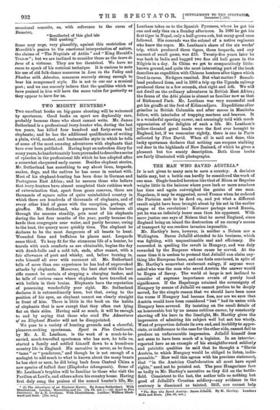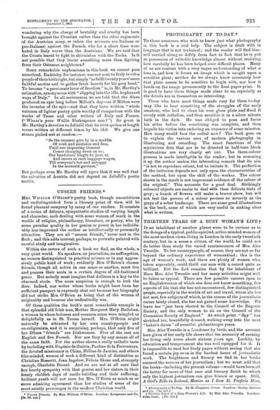THE MAN WHO SAVED AUSTRIA.*
IT is not given to many men to save a country. A decisive battle may, but a battle can hardly be considered the work of one man Single-handed heroism like that of Micca or Regulus weighs little in the balance where pure luck or mere numbers has time and again outweighed the genius of one man. Napoleon, it may be suggested, saved France when he ordered the Parisian mob to be fired on, and yet what a different result might have been brought about by his act in the earlier stages of the revolution! Kutusov perhaps saved Russia, yet he was an infinitely lesser man than his opponent. With more justice one says of Nelson that he saved England, since England being an island the destruction of an enemy's means of transport by sea renders invasion impossible.
Mr. Hartley's hero, however, is neither a Nelson nor a Wellington. Baron Jellane' attended to his business, which was fighting, with unquestionable zeal and efficiency. He succeeded in quelling the revolt in Hungary, and was duly rewarded by the Emperor whose cause he served. At the same time it is useless to pretend that JellaZili can claim any- thing like European fame, and one feels convinced, in spite of Mr. Hartley's somewhat exuberant eulogy, if anyone were asked who was the man who saved Austria the answer would be Eugen of Savoy. The world at large is not inclined to consider of supreme importance events of purely local significance. If the Hapsburgs retained the sovereignty of Hungary by means of Jella.e.ffi we cannot profess to be deeply moved, for the simple reason that we should have been none the worse if Hungary had become free, nor are we sure that Austria would have been considered " lost " had its union with Hungary been severed. By insisting on the small details of an honourable but by no means sublime career, by constantly showing off his hero in the limelight, Mr. Hartley gives the impression of admiring his subject well but not too wisely. Want of proportion defeats its own end, and inability to appre- ciate, or indifference to the case for the other side, cannot fail to produce an unfavourable impression. JellaCi6 himself does not seem to have been much of a logician. In an intervieT: reported here as an example of his straightforward soldier:a, and patriotic qualities he said that he thought a "Slavic: Austria, to which Hungary would be obliged to listen, indis- pensable." How well this agrees with his previous statement, that "in the Austrian Confederation all must have equal rights," need not be pointed out. The poor Hungarians fare as badly in Mr. Hartley's narrative as they did on the battle- field. Consistent to the last, the author tells us nothing but good of JelliaTs Croatian soldiery—any evidence to the contrary is dismissed as tainted. Still, one cannot help * The Man who Saved Austria : Baron JetiaZiS. By M. Hartley. London a Mills and Boon. [10e. 6d. net.]
wondering why the charge of brutality and cruelty has been brought against the Croatian rather than the other regiments of the Austrian army, or (when the accusers are Italians or pro-Italians) against the French, who for a short time were hated in Italy worse than the Austrians. We are told that the Croats learnt to fight in skirmishes with the Turks. Is it not possible that they learnt something more than fighting from their Ottoman neighbours ?
Some remarkable euphemisms in this book we cannot pass unnoticed. Radetsky, for instance, was not sent to Italy to rob a people of their birthright, but simply " to fulfil twenty years' more faithful service and to gather 'fresh laurels for his grey head." To become "a passionate lover of freedom" is, in Mr. Hartley's estimation, synonymous with "slipping into the idle, haphazard ways of Italy." In all seriousness we are told that the Slays produced an epic long before Milton's day—as if Milton were the inventor of the epic—and that they have written "whole volumes of lighter poetry quite worthy of comparison with the works of Tease and other writers of Italy and France.
(" Whaur's your Wullie Shakespeare noo P ") So great is Mr. Hartley's devotion to JellaZie' that he even quotes at length
verses written at different times by his idol. We give one stanza picked out at random :—
" Se the summer goes by in a muddle Of work and mistakes and fuss, Until our inspecting General Comes charging down on us ; Our bandoliers' length he jeers at, And sneers at each baggage wagon, Till everyone's hot and unhappy In the accuraki garrison."
But perhaps even Mr. Hartley will agree that it was well that the salvation of Austria did not depend on JellaSiii's poetic merits.







































































 Previous page
Previous page